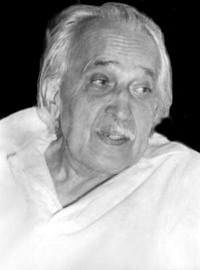 Kota Shivarama Karanth was a Kannada novelist, playwright, editor, filmmaker, painter, actor, and dancer. He was also famous as an educationist, environmentalist, translator, researcher and theoretician of art, theatre, and Yakshagana. He was the first modern Kannada lexicographer and encyclopedist. Rationalism and humanism pervade his writings. As a dramatist he advocated social criticism. Among his plays of this kind only Garbhagudi i.e. `Sanctum Sanctorum` in 1932 is considered successful, belonging to the same category as Bendre`s Uddhara and Adya Rangacharya`s Hari janwara. In it he blends symbolism and realism to depict the decadence of religion, and deals with several problems like untouchability. Natakavemba nataka i.e. `The Drama of Drama` in 1937 comments on early twentieth-century professional theatre as well.
Kota Shivarama Karanth was a Kannada novelist, playwright, editor, filmmaker, painter, actor, and dancer. He was also famous as an educationist, environmentalist, translator, researcher and theoretician of art, theatre, and Yakshagana. He was the first modern Kannada lexicographer and encyclopedist. Rationalism and humanism pervade his writings. As a dramatist he advocated social criticism. Among his plays of this kind only Garbhagudi i.e. `Sanctum Sanctorum` in 1932 is considered successful, belonging to the same category as Bendre`s Uddhara and Adya Rangacharya`s Hari janwara. In it he blends symbolism and realism to depict the decadence of religion, and deals with several problems like untouchability. Natakavemba nataka i.e. `The Drama of Drama` in 1937 comments on early twentieth-century professional theatre as well.
Kota Shivarama Karanth was born in the year of 1902. His theatrical fame rests upon his lyrical drama, like Kisa Gotami published along with others in 1951, and his attempts to create operas in Kannada. He used the folk tunes of southern Karnataka and composed the choreography for these works. His Mukta dvara i.e. `Open Doors` in 1930 was based on the evolution of human civilization. This is regarded as the first modern Kannada musical. Karanth staged three different kinds of production for his other operatic play, Lava-Kusha i.e. `Lava and Kusha`. He rediscovered old forms and techniques like shadow puppetry for Kannada theatre, and founded the Yakshagana Kendra School and repertory in Udupi, Dakshin Kannad district, in 1971. Kota Shivarama Karanth`s experiments in introducing modern choreography to traditional Yakshagana through his non-verbal Yaksharanga `ballets`, taken on tour in India and abroad, were controversial but important and meaningful. As an educator he modernized the teaching of Yakshagana acting. His research into Yakshagana`s origin, growth, and development is remarkable for its scholarship. Kota Shivarama Karanth died in 1999.
This article is a stub. You can enrich by adding more information to it. Send your Write Up to content@indianetzone.com



















